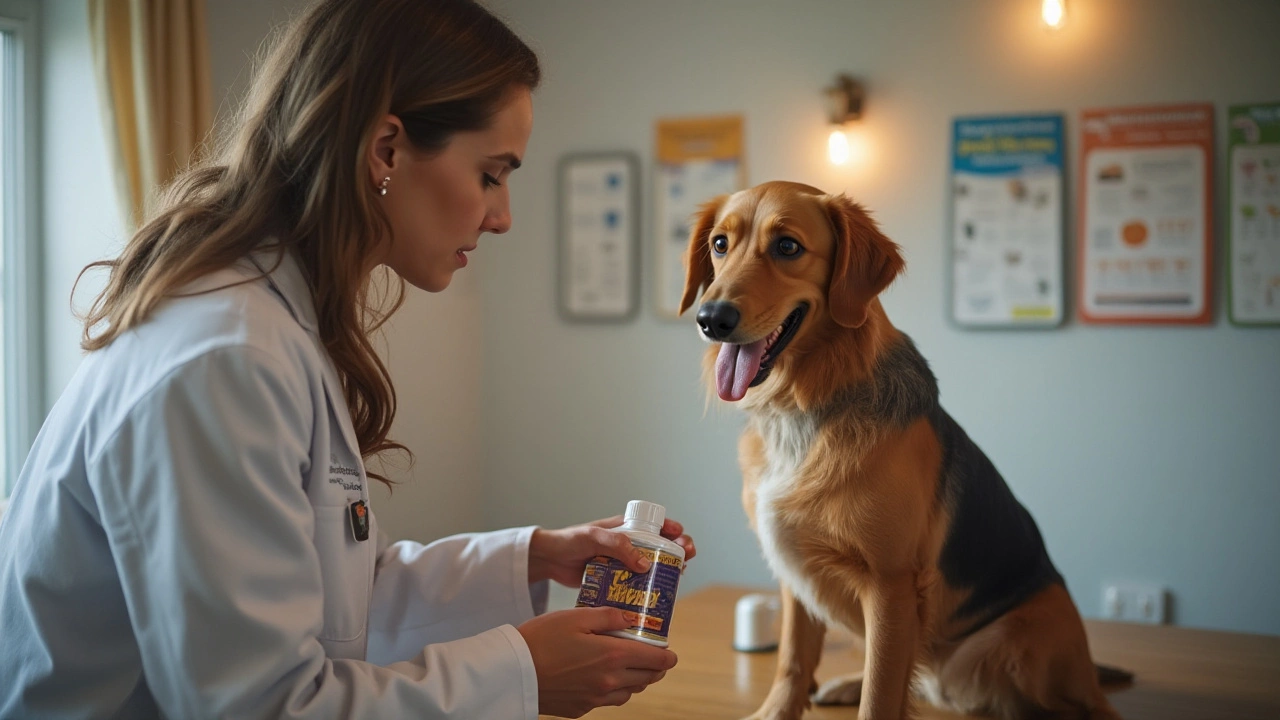In recent years, the pet industry has seen a surge in health supplements targeted at our furry companions. Rex, my playful pup, has been a testament to how proper nutrition can impact a dog's health and happiness positively.
But when you stroll down the aisle or scroll through an online store, you're met with a plethora of choices. There are supplements for joints, coats, digestion, and even mood. Understanding what these products offer and whether they are worth incorporating into your pet's diet is essential for any responsible dog owner.
Join us as we explore the world of dog supplements, dissect key ingredients, and help you navigate the benefits and risks. By the end of this article, you'll have a clearer view of whether these products deserve a spot in your canine care routine.
- Understanding Dog Supplements
- The Role of Key Ingredients
- Benefits and Risks
- Choosing the Right Supplements
- Expert Tips for Pet Owners
Understanding Dog Supplements
Walking into any pet store, one is immediately struck by the dizzying array of dog supplements available on the shelves. It's an ever-growing market, reflective of how much we care about our canine companions' health. Many pet owners, eager to give their dogs every possible benefit, often wonder what these supplements are really about and what they can do. These products range from chewable tablets to powders and even liquid drops, often aimed at improving various aspects of a dog's health.
At the most basic level, dog supplements are dietary additions designed to complement a pet’s normal diet by providing extra nutrients that might be lacking. For instance, while commercial dog foods are formulated to meet certain canine dietary requirements, they may not address specific health issues. This is where supplements step in, often promising to enhance canine wellness. They come enriched with vitamins, minerals, fatty acids, amino acids, and other beneficial compounds. In particular, omega-3 fatty acids found in fish oil are lauded for promoting a shiny coat and supporting heart health.
It's important to recognize that not all dogs need supplements. According to the American Kennel Club, the key lies in knowing what’s beneficial for your dog based on their unique health conditions, age, and lifestyle. Some of the most popular dog health supplements are those geared toward joint health. Glucosamine and chondroitin, notable examples, are often used to alleviate arthritis symptoms in aging dogs. However, the effectiveness of such supplements can vary, and it’s vital for pet owners to consult with a veterinarian before introducing new elements into their dog’s diet.
"While dietary supplements can be beneficial, they aren’t a substitute for a well-balanced diet," notes Dr. Julie Buzby, a respected veterinarian. "It's crucial to discuss your pet's specific health needs with your vet to avoid unnecessary risks."
The landscape of pet health has evolved significantly, with advancements shedding light on how nutrition impacts longevity and quality of life. Alongside joint health supplements, digestive aids have gained popularity, especially probiotics. These are designed to promote a healthy gut microbiome and can be particularly useful for dogs with sensitive stomachs or those recovering from antibiotics. By aiding in nutrient absorption and supporting immune function, probiotics can contribute significantly to dog nutrition.
As enticing as supplement claims may be, caution is advised. Notably, the supplement industry is not as stringently regulated as pharmaceuticals, meaning the efficacy and safety of some products may not be well-established. Consumers must be diligent in selecting products from reputable brands that adhere to quality standards. Reading labels carefully, understanding active ingredients, and opting for supplements that have been tested or approved by canine nutrition experts can help ensure that your pet receives the best care possible.
The Role of Key Ingredients
Understanding the ingredients in dog supplements is crucial for selecting the right product for your furry friend. Many supplements target different health aspects: joint health, immune support, skin and coat enhancement, or digestive aid. The effectiveness of these supplements largely depends on their formulation and the scientific evidence supporting their ingredients. A prime ingredient in joint supplements for dogs is Glucosamine, often paired with Chondroitin. Together, they are hailed for their ability to support and maintain cartilage, potentially improving mobility in aging dogs. Glucosamine is a natural compound found in cartilage, and it helps maintain its structure and integrity. Chondroitin, on the other hand, offers resistance against damaging enzymes in the joints. These components, often derived from shellfish or made synthetically, form the backbone of many joint health products on the market.
Omega-3 fatty acids, including EPA and DHA, are staples in supplements for canine wellness, particularly for skin and coat health. Sourced from fish oils or flaxseed, these essential fatty acids play a vital role in reducing inflammation and promoting heart health. They are also known to support cognitive function, which is crucial for older dogs experiencing cognitive decline. Omega-3s can help mitigate skin allergies and conditions, like dry coat, by enhancing skin barrier function and reducing itchiness. Including these in your dog’s diet may lead to a shinier coat and less shedding, something any pet owner would appreciate.
Pet health supplements also frequently contain probiotics, supporting the digestive and immune systems. These live microorganisms, often referred to as "good bacteria," are designed to enhance the gut flora, improving digestion and nutrient absorption. Certain strains, like Lactobacillus and Bifidobacterium, have been studied for their ability to prevent gastrointestinal issues and support a balanced immune response. Since a significant portion of a dog's immune system is linked to the gut, maintaining its health is pivotal. Interestingly, a study by the Journal of Veterinary Internal Medicine highlights that probiotics can reduce the frequency and severity of diarrhea in dogs, underlining their potential benefits.
Calming supplements often contain natural herbs and extracts such as chamomile, valerian root, and L-theanine, a compound found in green tea. These ingredients are renowned for their tranquilizing properties and are used to alleviate stress and anxiety in dogs, whether from storms, travel, or separation. Valerian root, for instance, is favored for its mild sedative effects, providing a sense of calm in stressful situations. Pairing these natural remedies with training techniques can offer a holistic approach to managing a dog's anxiety without heavy reliance on pharmaceuticals.
"Research into dog supplements continues to evolve, offering more insight into the benefits of specific ingredients. Understanding the roles these individual components play is key to discerning their true value," notes Dr. Jennifer Coates, a veterinary advisor.
For immune system support, antioxidants like Vitamin E and C are common inclusions. They serve to combat free radicals, thereby reducing oxidative stress and supporting cellular health. Antioxidants have a storied history of being linked to better long-term health outcomes and disease prevention. Dogs, too, can benefit from their powerful protective properties, especially in boosting immunity against infections and chronic diseases. Making an informed choice on dog nutrition supplements starts by understanding these ingredients and aligning them with your pet’s specific needs and health goals.

Benefits and Risks
When considering dog supplements, it's crucial to weigh their potential benefits against the risks. Many supplements on the market promise to enhance aspects of canine wellness, such as joint health, coat shine, and even mood improvement. These products often contain ingredients like glucosamine, omega fatty acids, and probiotics, each targeting specific health concerns. For dogs suffering from arthritis, glucosamine is often recommended to maintain joint cartilage; omega fatty acids claim to improve skin health and reduce inflammation. With these supplements, many owners notice an evident improvement in their pet's agility and vitality, especially in older or more sedentary dogs. However, it is not just ageing pets who might benefit; very active dogs could also gain plenty from the added nutrients due to their high energy output.
Even with purported benefits, there are potential risks linked with pet health supplements. One primary concern is the lack of regulation in the supplement industry, leading to varying product quality. Without standardized oversight, some products may not contain the listed active ingredients in effective dosages. In a study by the National Animal Supplement Council, discrepancies were found in the actual composition of various products when compared to their labels. The potential for contaminants, allergens, or harmful ingredients mistakenly ingested could be a risk for unsuspecting pet owners aiming to enhance their dog’s health. Another risk involves over-supplementation, particularly if the pet is already on a balanced diet. Excessive intake of certain vitamins and minerals can lead to toxicity and adverse effects. For example, too much vitamin D can be harmful, leading to symptoms like vomiting or kidney problems.
The Importance of Consultations
To safely incorporate supplements into a pet's diet, consulting with a veterinarian is indispensable. A qualified professional can assess the specific needs based on the dog’s age, breed, existing medical conditions, and current diet, crafting a tailored approach to supplementation. Dr. Sarah Brown, a renowned veterinary nutritionist, advises,"While supplements can be beneficial, they are not a substitute for a complete diet. They should complement what you are already feeding your pet. Always consult with a vet to ensure you're providing the right balance."This consultative process helps mitigate the risks mentioned, ensuring that the right supplement, in the appropriate amount, is included in the pet's diet for tangible benefits without adverse consequences. Understanding specific requirements and modifying otherwise is key to balanced dog nutrition. Hence, it is advisable to tread cautiously, ensuring the well-being of furry companions remains the top priority.
Choosing the Right Supplements
When it comes to selecting the perfect dog supplements for your beloved pet, the process might feel like navigating a maze, especially given the boom in the pet health market. With shelves teeming with colorful labels and bold claims, it can be overwhelming to discern which products are genuinely beneficial. The first step is understanding what your dog specifically needs. Much like humans, dogs have unique dietary requirements based on factors such as age, breed, size, and health status. It's crucial to consult with a veterinarian who can offer tailored advice based on your dog's medical history and any particular health concerns you might have. Gleaning insights from someone with expertise ensures that you're not just following trends or marketing promises, but making decisions grounded in your pet's actual needs.
Nutritional deficiencies in dogs can manifest in various ways, such as dull coats, lethargy, or frequent illnesses. Identifying these signs early can help pet owners make informed decisions about supplements. Omega-3 fatty acids, for instance, are known for promoting healthy skin and shiny coats. They are commonly found in fish oil supplements, which have been shown to reduce inflammation and improve heart health in dogs. This is particularly beneficial for older dogs or breeds predisposed to joint issues. Secondly, probiotics have gained popularity for their potential to enhance digestive health. They help in maintaining gut flora, which is vital for nutrient absorption and a robust immune system. Studies have suggested that probiotics can play a role in alleviating conditions such as diarrhea and irritable bowel syndrome in pets.
"Not all supplements are created equal," says Dr. Karen Becker, a proactive and integrative wellness veterinarian. "It's important to choose high-quality products that have undergone rigorous testing for purity and potency. This ensures that they are not only safe and effective but also deliver real health benefits to your pet."
When selecting a supplement, scrutinizing the ingredients is critical. Ensure that the product contains active ingredients that align with your aims, whether it's supporting mobility, enhancing skin health, or boosting overall vitality. It's wise to avoid supplements with artificial additives and fillers. Transparency in labeling is a good indicator of a reputable brand, as is third-party testing. This independent verification can serve as assurance of the supplement's efficacy. Another consideration is the form of the supplement—whether it's in chewable tablets, powder, or liquid. The preference here often depends on your dog's taste and your convenience as an owner.
Sometimes, anecdotal evidence from other dog owners can provide additional insights. Join pet owner forums or communities where you can share experiences and recommendations. However, remember to cross-reference any claims with scientific research or veterinary advice. While testimonials can be helpful, professional guidance should remain your primary sources of information. Additionally, consider starting your dog on new supplements gradually to monitor any adverse reactions or positive changes. Documenting these observations can provide valuable data when discussing with your veterinarian. By approaching the decision-making process with diligence and a critical eye, you can significantly enhance your pet's quality of life.

Expert Tips for Pet Owners
When it comes to incorporating dog supplements into your pet’s routine, there are several factors pet owners need to consider to ensure their furry friends receive the maximum benefit without unnecessary risks. One of the primary steps is to consult your veterinarian before introducing any new supplement to your dog’s diet. Veterinarians can provide insights based on your dog’s unique health profile, history, and specific needs. This professional advice is crucial, as some supplements might interact with existing medications or might not be needed at all if your dog’s diet is already well-balanced.
Understanding the label on a supplement bottle can be overwhelming, yet it is a step that cannot be ignored. Look for products that have been independently tested by reputable organizations to confirm they contain the ingredients and amounts listed. Checking for quality certifications or seals can serve as reassurance about the product’s safety and efficacy. It's also important to consider the manufacturer’s reputation. Brands that invest in clinical research, have transparent sourcing, and publish detailed product information tend to be more reliable.
"Not all supplements are created equal. It's paramount for owners to do their homework and work closely with their vets," shares Dr. Karen Becker, a proactive and wellness veterinarian.
Pricing can be an indicator of quality, but not always. While it might be tempting to save money by purchasing the cheapest option, supplements that are unusually inexpensive might cut corners in ways that affect their quality. Always remember that investing in your dog’s health with quality supplements can mean fewer veterinarian visits and healthier, happier years with your pet. Look for natural, whole food options when possible, as these are generally gentler on the digestive system and more effective.
Monitoring your dog’s reactions to new supplements is critical. Keep an eye on any changes in behavior, digestion, skin condition, or energy levels. Documenting these changes over weeks can help determine if the supplement is making a positive impact or if it has unforeseen side effects. If adverse effects occur, discontinue use immediately and consult your vet. Introducing too many supplements at once can make it difficult to pinpoint which one is responsible for any changes observed, so it’s best to take a step-by-step approach.
A structured routine is helpful. Distributing supplements at the same time each day, paired with meals, is often recommended to enhance absorption and reduce the risk of gastrointestinal upset. Consider using a pill organizer designed for pets to keep track of your dog’s supplement schedule. This can help prevent missed doses and ensure consistency, which is essential for evaluating the supplement's effects on your dog’s health over time.
Educating yourself about specific ingredients in dog supplements can empower you to make informed choices. Omega-3 fatty acids, glucosamine, and probiotics are popular ingredients noted for supporting canine wellness in areas like joint function, coat shine, and digestive health. Recognizing these compounds and their sources helps you identify quality products and can guide conversations with your vet about what your dog may need. For instance, if your dog is prone to allergies, choose supplements with hypoallergenic and simplified ingredient lists.
Being proactive and staying informed lets you provide the best care for your canine companion. The world of pet health and supplements can be intricate, but with the right resources and guidance, it is a journey that strengthens the bond between you and your pet. Remember, knowledge is a powerful tool in ensuring that your pet’s dietary supplements truly enhance their life rather than complicate it.
